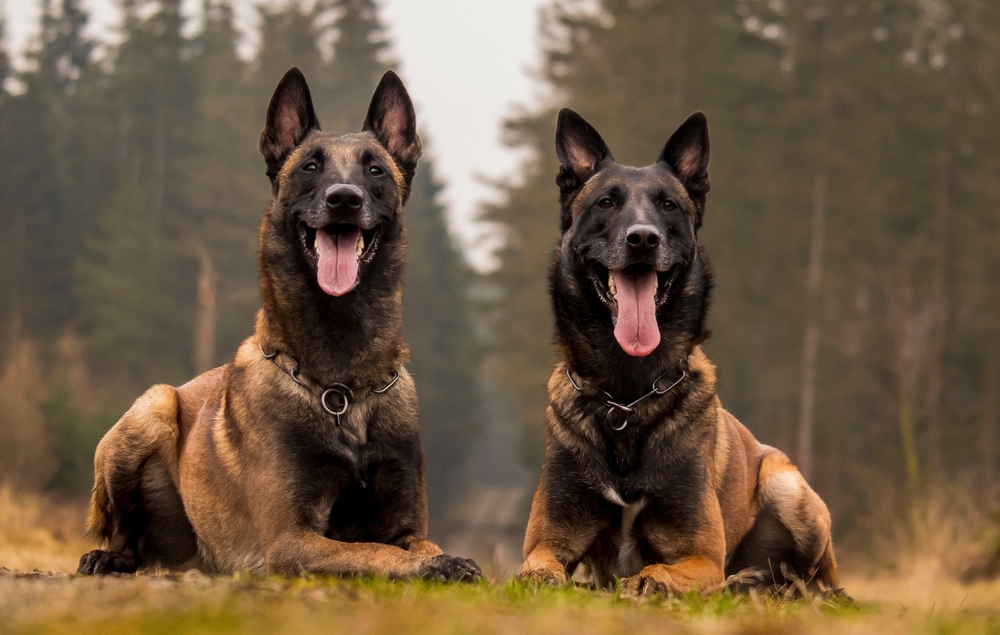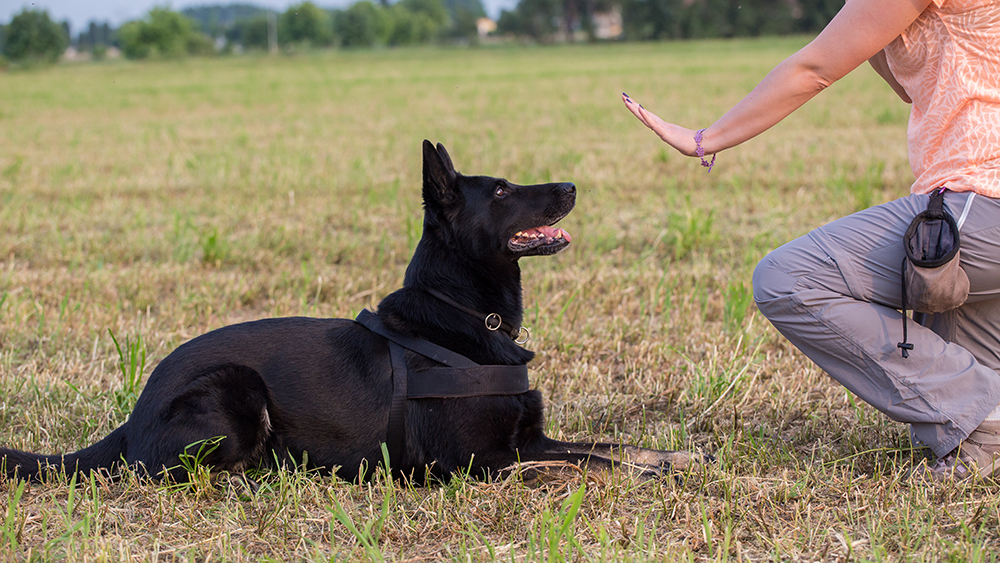Click Below to Skip Ahead
Have you been on the hunt for a new and rare dog breed? Then, you should take a look at the Akita Basset! This canine breed is new and rare enough that they can be hard to locate, but if you manage to find one, you’ll have an adorable pup who is extremely loyal and enjoys companionship.
If you’re unfamiliar with the Akita Basset breed, you’re in luck because we have you covered. Keep reading to learn all you should know before adopting one of these cute pups!
Breed Overview
Height:
15–28 inches
Weight:
50–90 pounds
Lifespan:
8–12 years
Colors:
Mix of the parent breeds’ colors and patterns
Suitable for:
Families with older children, experienced dog owners, moderately active families, or singles
Temperament:
Independent, slightly overprotective, affectionate, loyal
As you might have guessed from this breed’s name, the Akita Basset is a mixed breed created from breeding an Akita and Basset Hound. The result is an adorable pup with a strong sense of independence, a touch of stubbornness, and a fierce sense of loyalty. They can make wonderful companions for the right person but aren’t recommended for brand-new dog owners.
Akita Basset Characteristics
Akita Basset Puppies
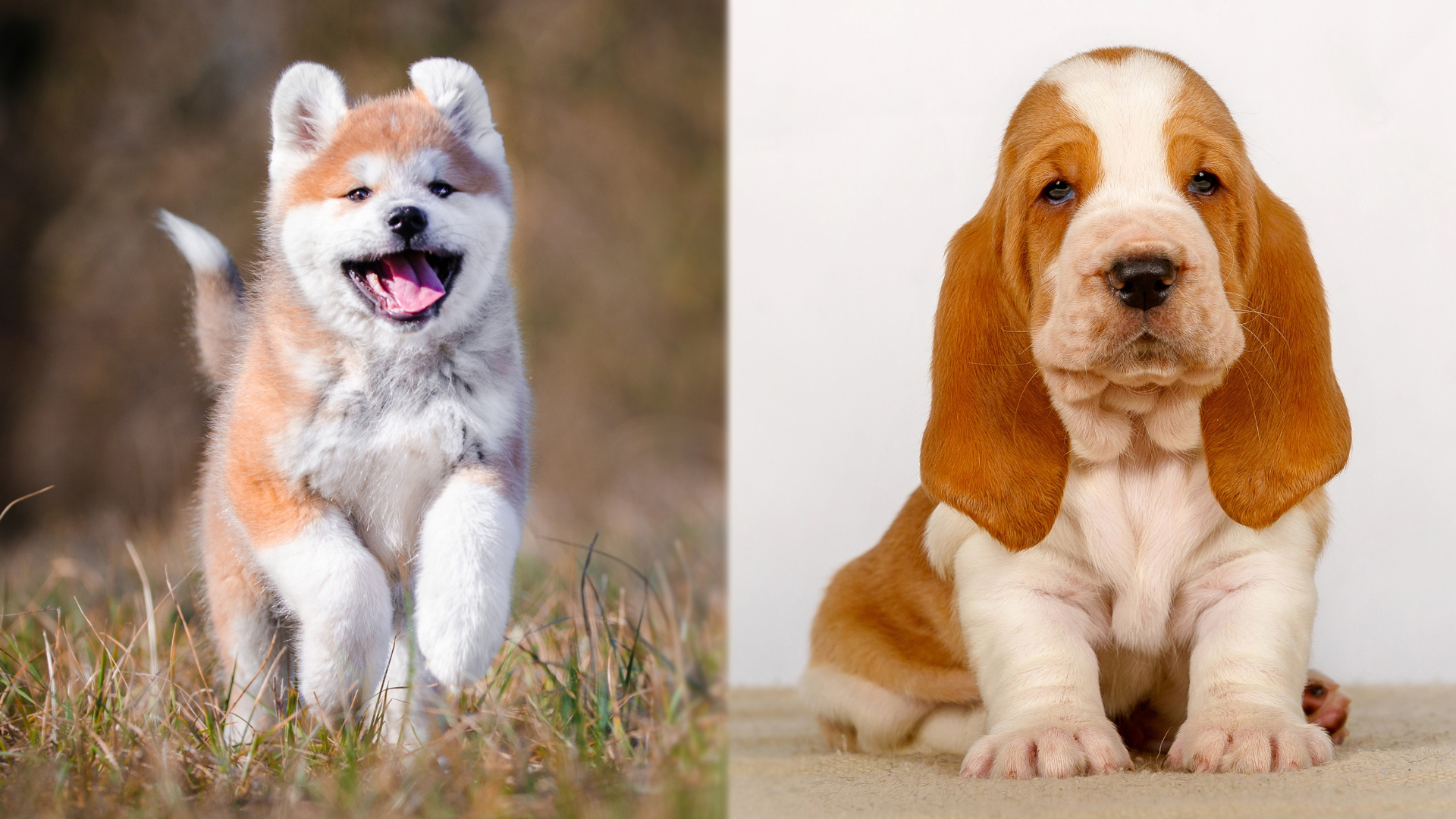
The Akita Basset is a very new and rare mixed breed, so you could have trouble locating one of these pups. Due to the rarity, you’ll almost certainly have to go through a breeder to get a puppy. However, ensure you’re using a reputable breeder. Don’t be afraid to ask questions about the puppy’s lineage and what sort of genetic and health testing has been done.
When it comes to personality, the Akita Basset puppy will be like most puppies—friendly and willing to play at all times!
Akita Basset Origin & History
Because this breed is so new, we don’t know where they originated, nor do they really have a history yet. However, we do know about the origins and history of the Akita Basset’s parent breeds.
The Akita is originally from Japan, where the breed is revered. In fact, the Japanese government declared it a national treasure in 1931! The Akita was used as fighting and hunting dogs; nowadays, it is often found doing guard or police work.
The Basset Hound is a fairly ancient breed, considering the canines thought to be the foundation of this breed showed up around 700 C.E. Monasteries bred these ancient dogs and eventually became the Basset Hound we know and love today (although the modern Basset Hound didn’t show up till somewhere between the 16th and 19th centuries). The breed was originally used for hunting and is still used for this purpose today.
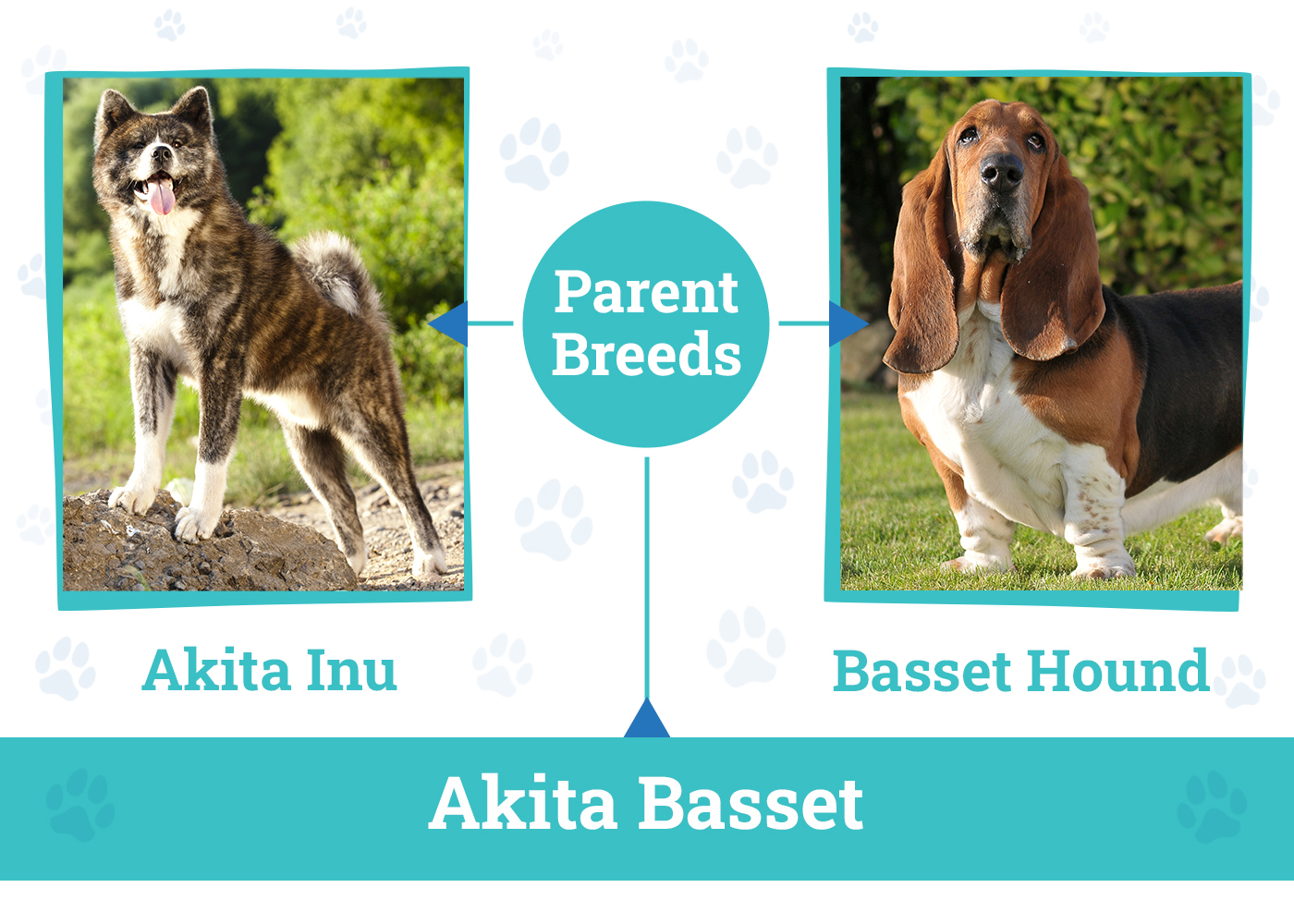
Temperament & Intelligence of the Akita Basset
Mixed-breed canines inherit personality traits from both parent breeds, so their temperament depends largely on which parent they take after most. In general, though, the Akita Basset is a fairly good-natured pup who is loving in their own way. The breed isn’t very affectionate but prefers to show their care via quiet companionship.
These pups are also incredibly loyal and protective; in fact, they can veer into overprotectiveness if they aren’t properly trained and socialized from a young age. The Akita Basset can engage in guarding behavior, like growling or lunging, without proper training. As such, the breed isn’t recommended for novice dog owners.
Despite the potential for overprotectiveness and guarding behavior, the breed is a pleasure to have around and can make an excellent companion for the right person.
Are These Dogs Good for Families? 👪
The Akita Basset is best suited to households with older children as the breed can sometimes be excitable and prone to nipping. With older children who know how to respect a dog’s boundaries and properly interact with one, the Akita Basset should become a good companion with a keen sense of loyalty. This breed may not always be playful after puppyhood, though, so make sure children are aware of that. Always supervise any interactions between canines and children, regardless of how well they get along!
Does This Breed Get Along With Other Pets? 🐶 😽
This is not a breed that will do well in multi-pet homes. The Akita Basset tends not to be fond of other canines and may show aggression towards other dogs in the house. However, if you get your Akita Basset as a puppy and raise them with another dog, they might be able to tolerate one another.
When it comes to smaller animals in the home, it’s a definite no, as the Akita Basset has a fairly strong prey drive and will chase after things smaller than them.
Things to Know When Owning an Akita Basset
There’s much more to know about owning an Akita Basset, like how to properly care for these pups. Here’s a closer look at everything you should know about living with an Akita Basset.
Food & Diet Requirements 🦴
The Akita Basset will require a diet consisting of high-quality dog food made for dogs of their size. Any dog food you purchase should be high in protein, ideally with meat from a good source listed as the first ingredient. When it comes to how much food an Akita Basset needs each day, it’s advisable to speak with your vet about the amount of food appropriate for your pet. Many things can affect how much food a dog requires daily, like activity levels, size, and breed.
Because of their Basset Hound background, the Akita Basset may enjoy being fed via snuffle mats or puzzle feeders. Even just hiding food around a room and letting them scent it out may be fun for them.
Exercise 🐕
The Akita Basset is only moderately active, so you don’t need to worry about exercising them for hours a day. These pups will be happy with about 30 minutes of exercise daily; two 15-minute walks should suffice. They’ll likely also enjoy shorter hikes and may even be up for a game of fetch in a (fenced-in) backyard!
Training 🎾
Akita Bassets must be trained to avoid becoming overprotective or engaging in guarding behavior later in life. However, they aren’t always the easiest to train, which is another reason they aren’t the best for novice dog owners. These pups inherit a sense of independence and can be stubborn, making training challenging.
By beginning to train your dog the moment you bring them home and with plenty of positive reinforcement and consistency, you can simplify the process for both of you. You may end up needing to call in a professional trainer with this breed, though.
Grooming ✂️
The grooming of an Akita Basset depends partly on which parent breed they physically resemble. If they have the short, thin, and dense coat of the Basset Hound, they’ll only need minimal brushing. But if they have the longer, thicker coat of the Akita, they’ll need to be brushed at least three times a week to prevent tangles and mats.
These pups don’t need to be bathed often (unless they’re truly filthy), so a bath once a month should suffice. These dogs may be a bit drooly at times, so if that’s the case with your Akita Basset, you’ll need to have some pet wipes on hand to clean them up. Besides these things, this breed should have their teeth brushed regularly, ears cleaned each week to prevent infections, and nails trimmed as needed.
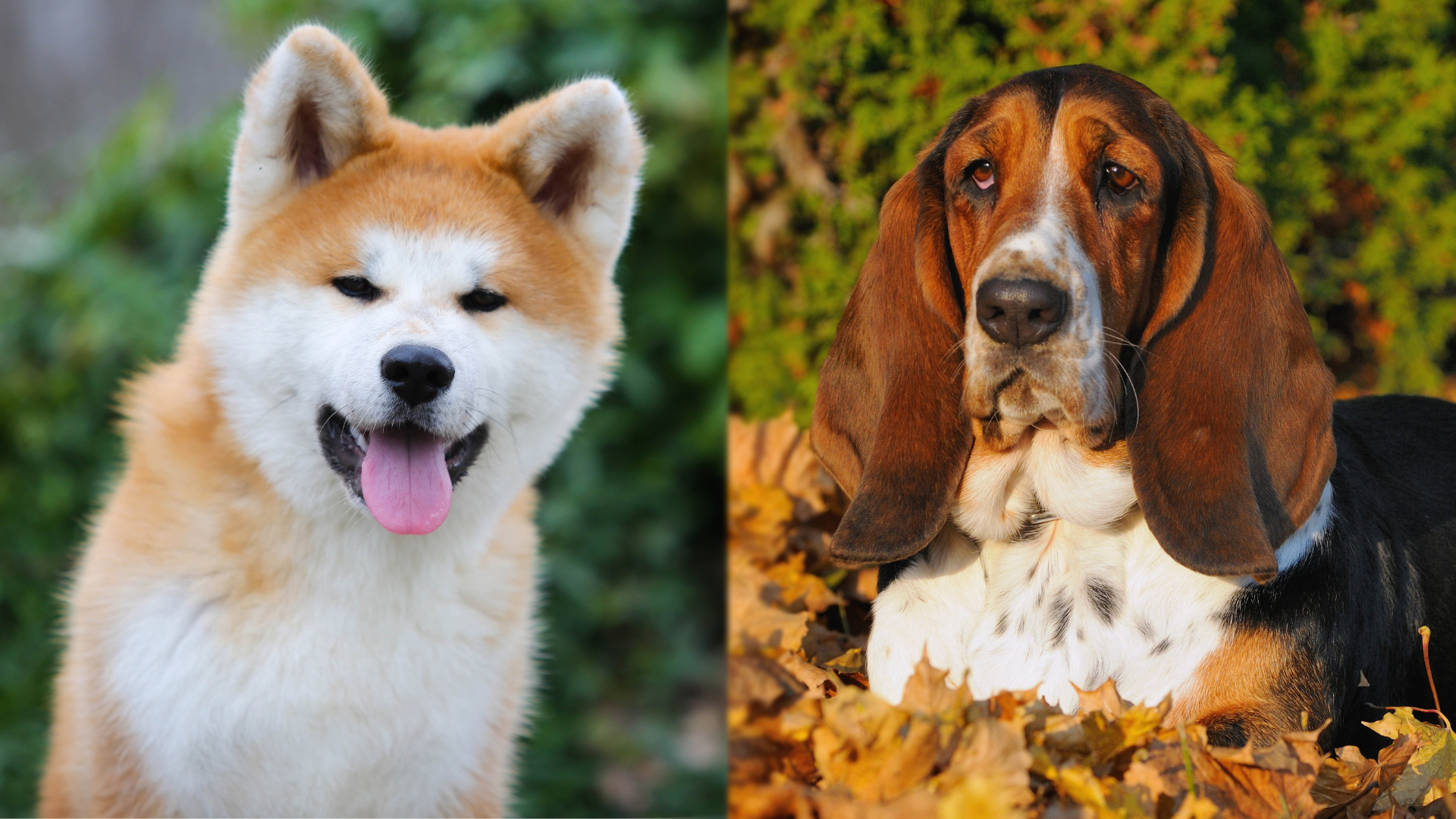
Health and Conditions ❤️
While an Akita Basset should be relatively healthy if gotten from an ethical breeder, there are still certain health conditions they are prone to inheriting from the parent breeds.
- Ear infections
- Skin issues
- Obesity
- Hip dysplasia
- Spinal deformities
- Glaucoma
Male vs Female
The Akita Basset’s temperament depends on which parent breed they take after most, not their sex. So, the only noticeable difference between males and females of this breed should be minute differences in size, as males will be slightly larger and heavier.
3 Little-Known Facts About the Akita Basset
What else is there to know about this mixed breed? Here are a few more facts about the Akita Basset!
1. This breed must have a fenced-in yard.
The Akita Basset is part Basset Hound, and the Basset Hound is known for their sense of smell. As such, the Basset Hound (and the Akita Basset) can be prone to catching the scent of an animal or something that seems exciting and wandering off. That means fenced-in yards are an absolute must for these pups.
2. The Akita Basset isn’t suitable for apartment living.
Besides being a bit large for apartment living, these pups can also be quite vocal. If they feel a need to express themselves for any reason, they will bark or howl, which is sure to displease those living close by.
3. These dogs aren’t well-suited to hot weather.
If you live in a hot climate, you’ll need to take precautions during extreme heat to cool your pup down, as this breed doesn’t do well with higher temperatures. Make sure your dog has plenty to drink and invest in cooling mats if the air conditioner isn’t doing a good enough job cooling your pet down.
Final Thoughts
The Akita Basset is an incredibly rare mixed breed that is still quite new, so they can be challenging to find. If you do find one of these canines, though, you can be sure you’re getting an extremely loyal and loving companion who will be quite protective and enjoy quieter companionship. Just watch out for their sense of independence, stubborn streak, and tendency to become overprotective; remember that early and extensive training is vital for this dog breed!
Featured Image Credit: (L) Ann Tyurina, Shutterstock | (R) Bill Anastasiou, Shutterstock






